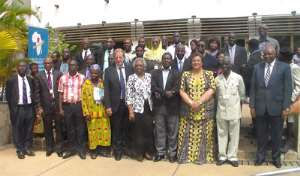
Dr. Kwadwo Afari-Gyan (second right), Hannah Tetteh (Third Right) Thelma Iremiren (fifth right) and Claude Maerten (Fifth Left) in a post with other participants after the opening ceremony.
HEADS OF electoral bodies and representatives of political parties from all parts of Africa – supported by a special delegation from the European Union (EU) – have commenced a three-day workshop in Accra on the application and sustainability of biometric technology in election management on the continent.
The conference is expected to enable countries like Nigeria, Kenya and Ghana, which have begun the use of Biometric Technology in their electoral systems, share their experiences on the use of the system with other African countries that are yet to adopt the system.
The seminar is jointly being organized by the Electoral Commission of Ghana, Association of African Election Authorities (AAEA) and the European Union.
Chairman of Ghana's Electoral Commission, Dr. Kwadwo Afari-Gyan, in his welcome address, disclosed that the use of technology in election administration was becoming increasingly popular on the continent.
According to him, 'Technology has been used in elections in Africa, not as an end in itself, but for several purposes, including solving problems of efficiency, credibility and acceptance of results.'
Dr. Afari-Gyan indicated that even though the use of biometric technology was necessary for free and fair elections, the system came with risks.
'As useful as technology can be to election administration, there is no doubt at all that the use particularly of biometric technology, comes with risks right from the tender process, but in particular risks associated with maintenance and support in the field, storage, preservation, and security of data, and the sustainability of the entire system,' the EC Chairman, expected to retire next year, noted.
He warned that 'Technology should not promote efficiency at the expense of the fundamentals of good election which include thorough preparations, accuracy, transparency and fairness.'
Minister of Foreign Affairs and Regional Integration, Hannah Tetteh, in a keynote address, observed how electoral processes on the continent had been marred and continue to be marred by irregularities.
'The perception of irregularities and unfairness has dire consequences and there is the need for practical measures to solve the problem,' the minister urged.
Several factors, she said, account for the rejection of election results on the continent, including over-voting.
Commenting on the use of biometric technology, Ms Tetteh indicated how the system, which was used in the 2012 elections of Ghana, had helped in minimizing electoral disputes on the continent.
She, however, recognized the need for cyber security and the control of cyber fraud through the use of the system in order to boost and sustain the citizenry's confidence in the use of the technology.
Thelma Iremiren, an election official from Nigeria, who chaired the opening ceremony, said the biometric technology was the best bet for elections in Africa, considering the level of electoral challenges confronting the continent.
Meanwhile, Claude Maerten, Head of the EU Delegation, disclosed that the donor community had reshaped its approach to the support it renders to poor countries to organize their periodic elections.
'EU attaches high importance to the development of electoral processes and democracy and the rule of law, he asserted.'
According to him, electoral bodies that had used the biometric system on the continent had benefited immensely from doing so.
BY Melvin Tarlue




 Saglemi Housing Project will not be left to rot – Kojo Oppong Nkrumah
Saglemi Housing Project will not be left to rot – Kojo Oppong Nkrumah
 Transport fares hike: GPRTU issue two-day ultimatum
Transport fares hike: GPRTU issue two-day ultimatum
 ARC endorses Alan as presidential candidate – Buaben Asamoa
ARC endorses Alan as presidential candidate – Buaben Asamoa
 Akufo-Addo appoints Kwasi Agyei as new Controller and Accountant-General
Akufo-Addo appoints Kwasi Agyei as new Controller and Accountant-General
 PNC dismiss reports of mass resignations
PNC dismiss reports of mass resignations
 PAC advocates for revenue collectors to be engaged on commission basis, not full...
PAC advocates for revenue collectors to be engaged on commission basis, not full...
 Genser Energy commissions 110km of natural gas pipeline at Anwomaso
Genser Energy commissions 110km of natural gas pipeline at Anwomaso
 Naa Torshie calls for tolerance, peace ahead of 2024 election
Naa Torshie calls for tolerance, peace ahead of 2024 election
 Asantehene commends Matthew Opoku Prempeh for conceiving GENSER Kumasi Pipeline ...
Asantehene commends Matthew Opoku Prempeh for conceiving GENSER Kumasi Pipeline ...
 Let’s do away with ‘slash and burn politics’ in Ghana — Dr Adutwum
Let’s do away with ‘slash and burn politics’ in Ghana — Dr Adutwum
